

Why Enterprises Migrate into Cloud Technology? Developing Application Integration solution to simplify collaboration between business teams. Posted in - Case Studies Date - 13 Apr. 2015 A US based leading supplier of eye and healthcare products, such as contact lenses and lens care products through its global business divisions in the Americas, Europe, Middle East, Africa and Asia.
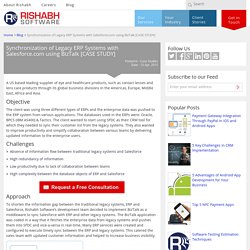
Objective The client was using three different types of ERPs and the enterprise data was pushed to the ERP system from various applications. The databases used in the ERPs were: Oracle, BPCS (IBM AS400) & Tactics. The client wanted to start using SFDC as their CRM tool for which they needed to sync their customer list from the legacy systems. Challenges. How cloud-based ERP can give your business a boost. A couple of years ago, Unionwear, a clothing and accessaries manufacturer-based in Newark, N.J., employed a patchwork of systems to run its business.
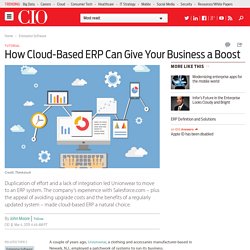
Headquarters used Sage Pro accounting software to manage the books, while individual plants used Microsoft Access and Excel spreadsheets to track manufacturing activities. Unionwear, a 120-employee company, lacked a unified, enterprise-wide system. “We were running a number of different systems -- and leaving a lot of gaps,” said Mitch Cahn, president of Unionwear. Calculating Costs for Each Run One such gap was the lack of a perpetual inventory system. Application integration demands a light touch in the cloud. The appeal of cloud applications is irrepressible.
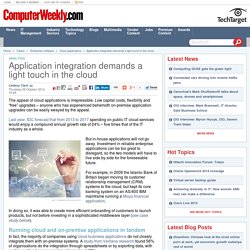
Low capital costs, flexibility and “free” upgrades – anyone who has experienced behemoth on-premise application upgrades can be easily swayed by the appeal. Last year, IDC forecast that from 2013 to 2017 spending on public IT cloud services would enjoy a compound annual growth rate of 24% – five times that of the IT industry as a whole. Getty Images/iStockphoto But in-house applications will not go away. Investment in reliable enterprise applications can be too great to disregard, so the two models will have to live side by side for the foreseeable future. For example, in 2009 the Islamic Bank of Britain began moving its customer relationship management (CRM) systems to the cloud, but kept its core banking system on an AS/400 IBM mainframe running a Misys financial application. Integrating cloud ERP and CRM applications? Show how it can pay. CRM systems were some of the earliest business systems to head to the cloud.
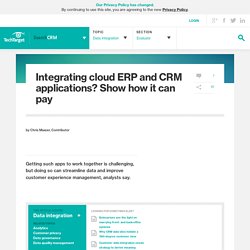
Now as ERP systems are increasingly being moved off-site, the next step for customers is integrating cloud CRM and ERP applications, industry observers say. Why is that integration so natural? It's not because both these sets of enterprise applications can be delivered by the cloud. No, it all comes back to business demands -- the cloud is just a delivery mechanism of choice because of cost advantages, even though it can pose some unique challenges to integration. Benefits of ERP-CRM integration. By submitting your personal information, you agree to receive emails regarding relevant products and special offers from TechTarget and its partners.
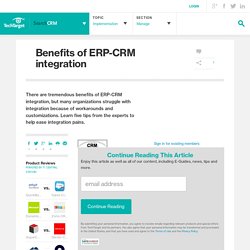
You also agree that your personal information may be transferred and processed in the United States, and that you have read and agree to the Terms of Use and the Privacy Policy. CRM integration is a major challenge for organizations of all sizes. In this new series, SearchCRM.com will explore best practices for integration between CRM and other systems. If you have suggestions or comments about this series, please contact us at editor@searchcrm.com. Integrating Software as a Service (SaaS) CRM and ERP applications. CRM integration is a major challenge for organizations of all sizes.
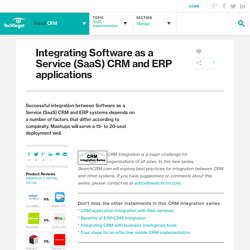
In this new series, SearchCRM.com will explore best practices for integration between CRM and other systems. If you have suggestions or comments about this series, please contact us at editor@searchcrm.com. Don't miss the other installments in this CRM integration series * CRM application integration with Web services * Benefits of ERP-CRM integration * Integrating CRM with business intelligence tools * Four steps for an effective mobile CRM implementation The strategy you choose for integrating SaaS CRM with other enterprise applications will depend on how advanced your SaaS deployment is.
Manufacturer finds success with cloud-based ERP system. Roddy McKaig isn't new to the cloud.
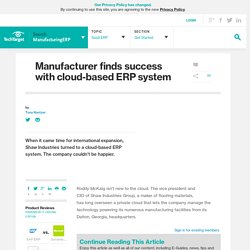
The vice president and CIO of Shaw Industries Group, a maker of flooring materials, has long overseen a private cloud that lets the company manage the technology powering its numerous manufacturing facilities from its Dalton, Georgia, headquarters. By submitting your personal information, you agree to receive emails regarding relevant products and special offers from TechTarget and its partners. You also agree that your personal information may be transferred and processed in the United States, and that you have read and agree to the Terms of Use and the Privacy Policy. The ERP systems Shaw had long depended on were running on virtualized servers in Dalton, and they were serving the company well. But they had limits, and when Shaw announced plans to build a new plant in China in 2011 -- its first outside the U.S. -- those limits forced McKaig into action. Once Shaw made the call in June 2012 to bring in NetSuite, it was full steam ahead.
Next Steps. Cloud, CRM, ERP and Mobility Improve Productivity. By Chris Kenny When you hear about companies running their entire business in the cloud, with executives on the go working from their phones and employees collaborating on social media, you probably don’t envision a 77-year-old custom gasket manufacturing company in Chicago.
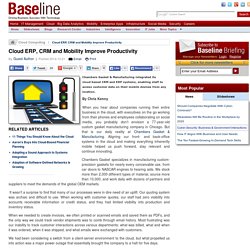
But that is our daily reality at Chambers Gasket & Manufacturing. Aligning our front- and back-office systems in the cloud and making everything inherently mobile helped us push forward, stay relevant and continue innovating. Chambers Gasket specializes in manufacturing custom-precision gaskets for nearly every conceivable use, from car doors to NASCAR engines to hearing aids. We stock more than 2,000 different types of material, source more than 10,000, and work daily with dozens of partners and suppliers to meet the demands of the global OEM markets.
It wasn't a surprise to find that many of our processes were in dire need of an uplift. Working Anywhere, Anytime Not bad for an old-school company, is it?